ACEP ID:
- My Account
- My CME
- Sign Out
ACEP ID:

The 2020 No Surprises Act (NSA) established new federal protections against surprise medical bills and balance billing, most of which took effect January 1, 2022. Below is a summary of the major No Surprises Act requirements and what they mean for you.
To learn more about ACEP’s many years of advocacy on this issue that led up to this law, click here.
The No Surprises Act:
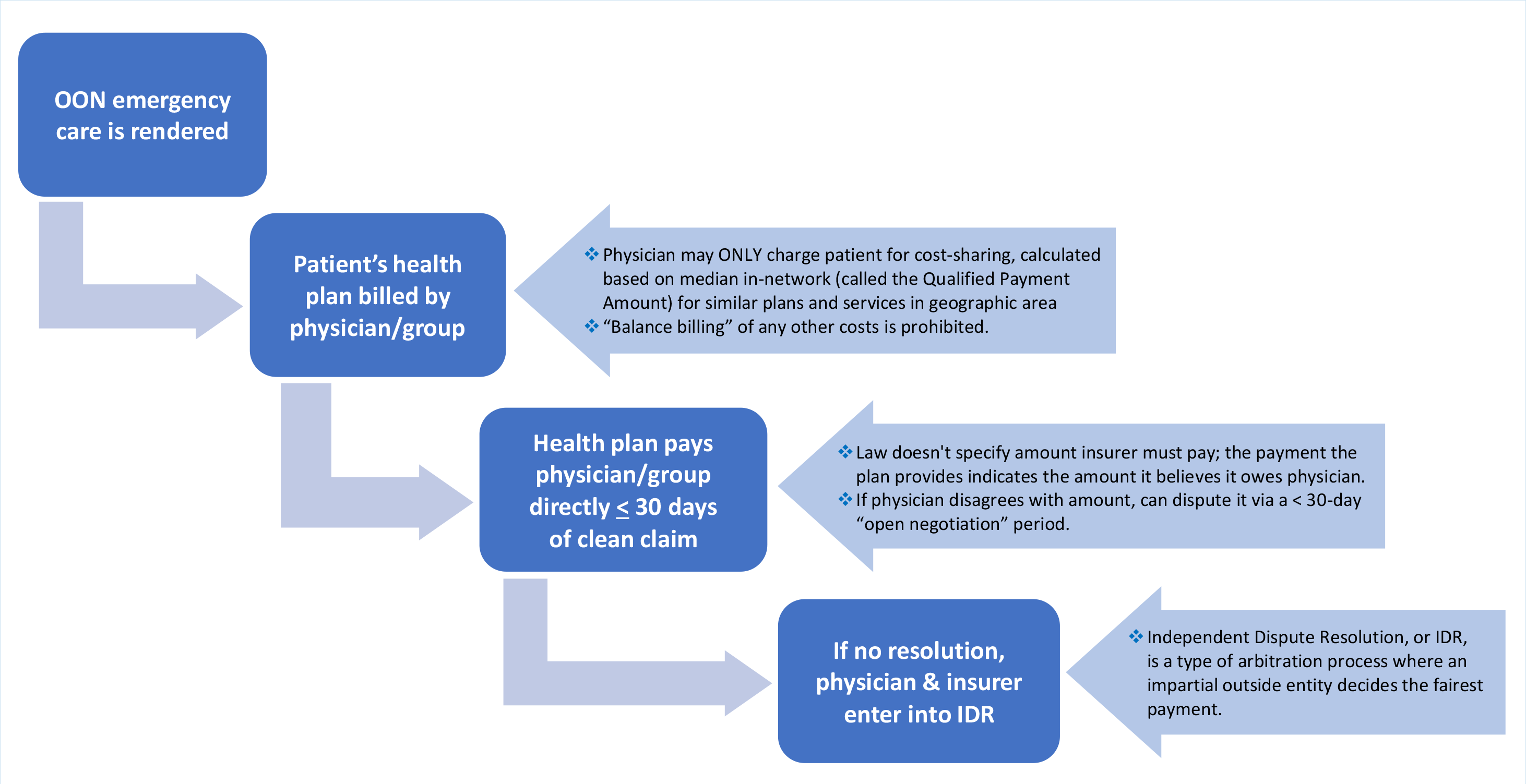
The No Surprises Act does NOT make any changes to your EMTALA obligations, including the medical screening exam and stabilization definitions and requirements that have been in place for decades.
However, the law DOES extend the ban on balance billing to additional services that patients may receive in conjunction with an emergency visit even after they are stabilized—a new concept known as “post-stabilization services” in the law.
Thus, a patient coming to your ED to be treated for a medical emergency cannot be balance billed for any of the out-of-network services they receive up to the point of stabilization, NOR for the care they receive once they are:
The balance billing protections end when you discharge the patient. They also can end when under your clinical judgment the out-of-network patient could have been transferred to a participating facility safely and without undo financial burden using a non-emergency form of transportation (like the patient’s car, a bus, or a taxi), AND the patient signs a notice-and-consent given to them by the subsequent clinician.
The online IDR portal opened April 15, 2022. Generally, the IDR process will follow a “baseball-style” approach, following these steps.
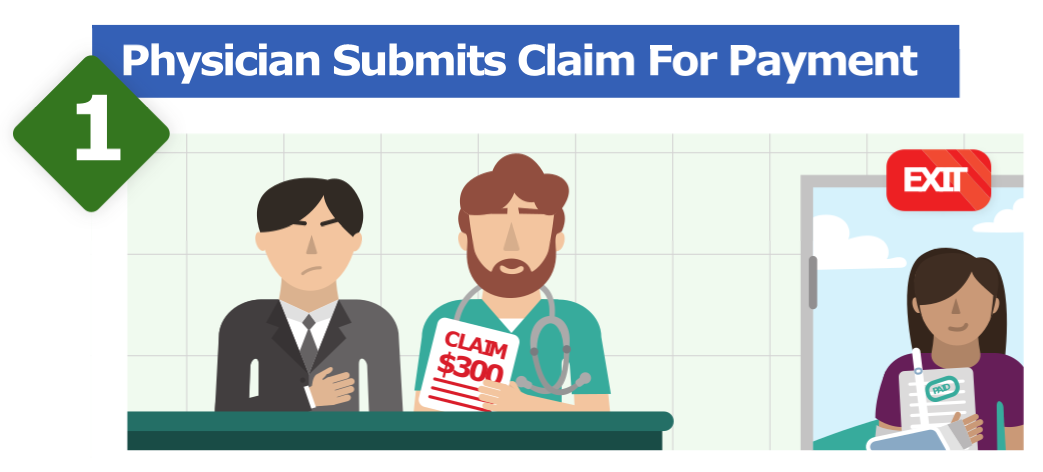
ER physician submits claim to patient's insurer. The patient is only responsible for any costs as if in-network, and is now out of the middle.
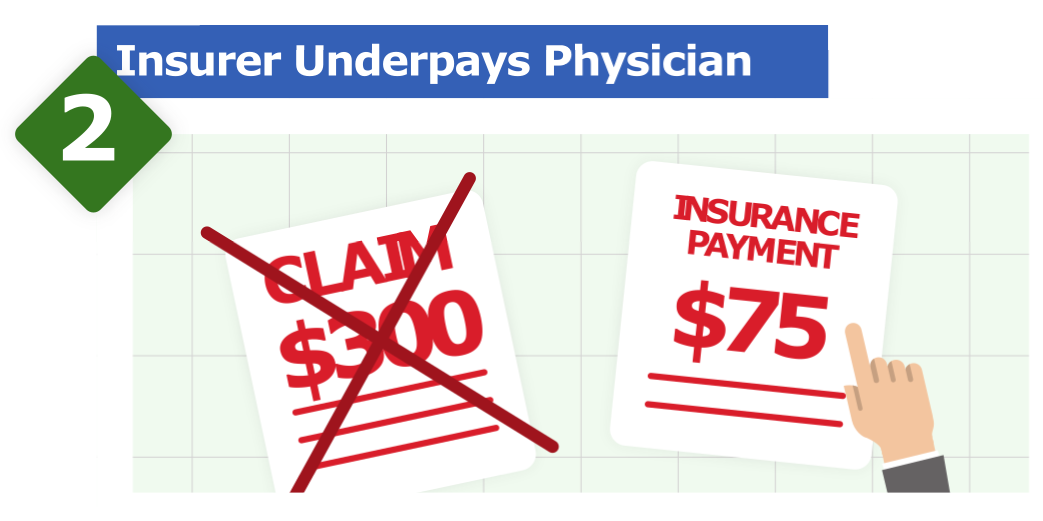
Physician/group can dispute the amount during the 30-day open negotiation period.
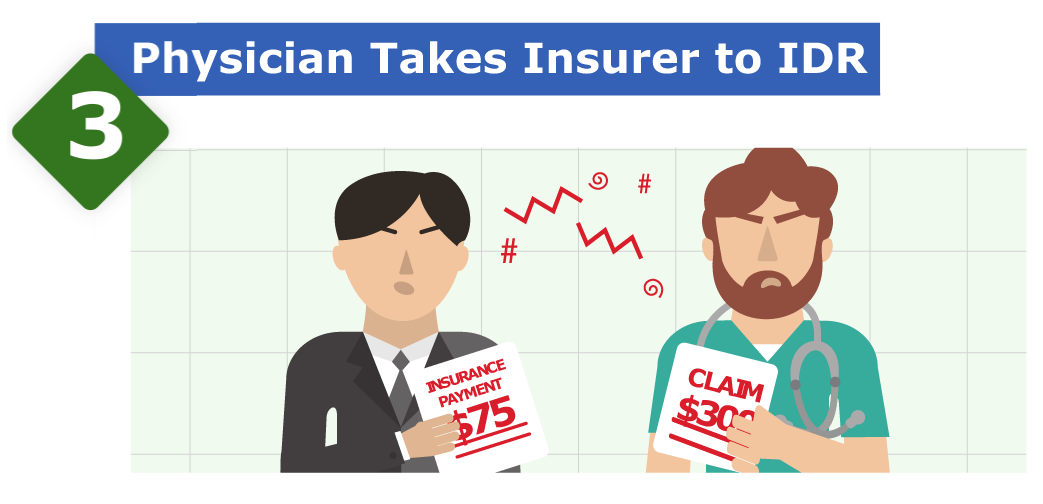
If that fails, either party can take the dispute to IDR using an online portal. They'll select an arbiter from a pre-vetted list of IDR entities. Both parties must pay the IDR fee up-front ($200-500 for one claim; $268-670 for "batched" claims of similar services with that same insurer).
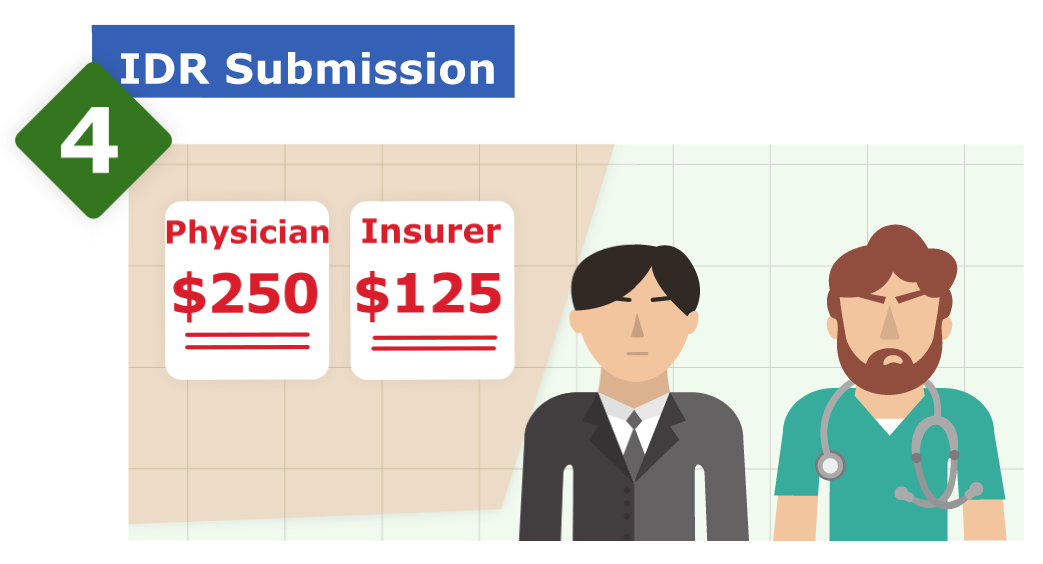
Each party submits offer < 10 days for reasonable payment. Offer must include:
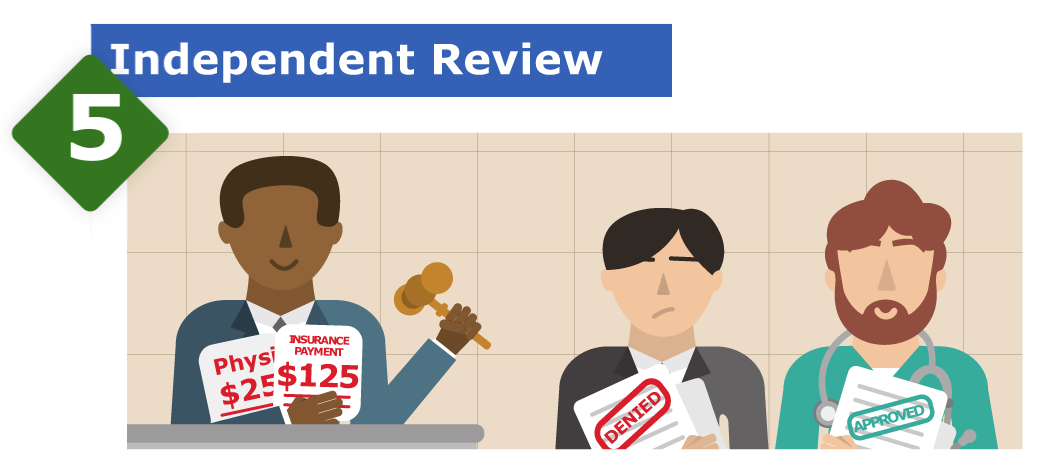
An impartial reviewer evaluates both submission and chooses one of the two payment amounts within 30 business days after the reviewer is selected. They can't come up with their own amount; it must be one of the two proposed.
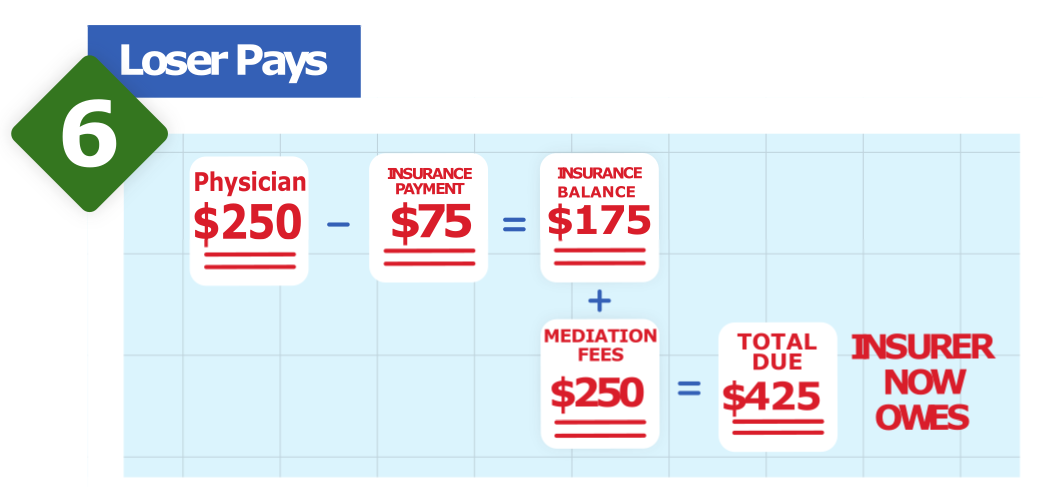
The loser has to make the other side whole and pay for the IDR fee within 30 calendar days. The winner gets their filing fee refunded within 30 business days.
Remember, this federal IDR process will only be used for disputes for which no specified state law applies (see section below).
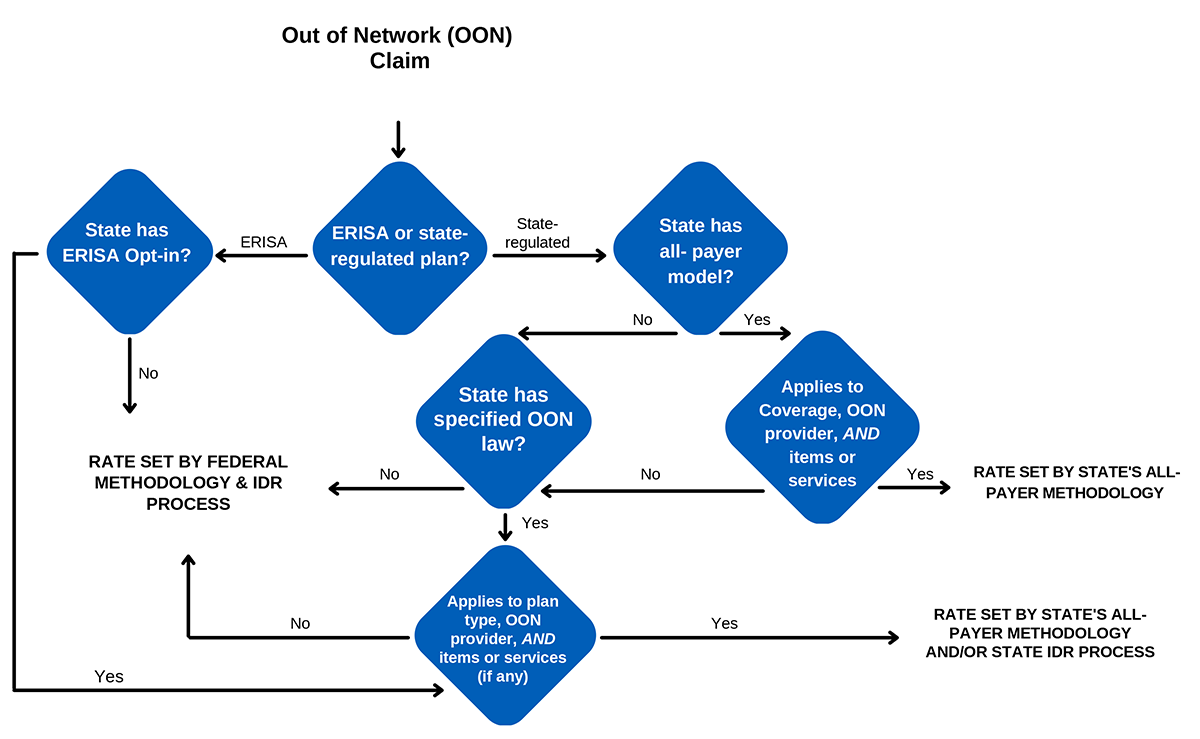
1) For emergency patients under a state-regulated insurance plan (such as employer-sponsored commercial plans):
2) For federally regulated insurance plans (such as ERISA/employer self-funded or federal Marketplace plans under the ACA), the federal law’s initial payment and IDR process governs the OON payment amount. Note: In some states, ERISA plans are allowed to opt-in to the state law.
The federal government has already released guidance designating some states as having a qualifying law. See table below, which will be updated as more guidance comes in on the remaining states.
State/Territory
Direct Enforcement of NSA
Adverse Determinations
IDR Process
Patient-Provider Dispute Resolution
Federal Government (CMS)
Federal External Review Process
Federal IDR Process applies
Federal process applies
Collaborative Agreement
Federal External Review Process
3 Alaska Admin. Code § 26.110(a) is a specified state law that will apply for purposes of determining the out-of-network rate with respect to items and supplies furnished to individuals in an insured group health plan, or group or individual health insurance coverage in Alaska by nonparticipating providers, nonparticipating emergency facilities or nonparticipating providers of air ambulance services. Federal IDR process will only apply for services not applicable to the state law.
Federal process applies
Federal Government (CMS)
Federal External Review Process
Federal IDR Process applies
Federal process applies
Arizona will enforce certain provision of the law and the Federal Government will enforce others
Federal External Review Process
Federal IDR Process applies
Federal process applies
Collaborative Agreement
Federal External Review Process
Federal IDR Process applies
Federal process applies
Collaborative Agreement, with the Federal Government enforcing certain provisions and California others.
Federal External Review Process
Cal. Health and Safety Code §§ 1371.30, 1371.31, and 1371.9, and §§ 10112.8, 10112.81 and 10112.82(a) of the Insurance Code are specified state laws that will determine the out-of-network rate for non-emergency services furnished to individuals in health care service plans and certain health insurance plans in California by noncontracting individual health professionals at contracting health facilities. The Federal IDR process will apply to other out-of-network services that the California law does not cover.
Federal process applies
Collaborative Agreement, with the Federal Government enforcing certain provisions and Colorado others.
Federal External Review Process
CR.S. § 10-16-704(3)(d)(II), § 10-16-704(5.5), and § 10-16-704(15) are specified state laws that will determine the out-of-network rate with respect to items and services furnished to individuals in an insured group health plan, or group or individual health insurance coverage in Colorado by nonparticipating providers or nonparticipating emergency facilities.
Federal process applies
Collaborative Agreement
Federal External Review Process
CGS Sec. 38a-477aa-- specified state law that will apply for "purposes of determining the out-of-network rate with respect to certain health care services by out-of-network health care providers at an in-network facility or an out-of-network clinical laboratory upon referral of an in-network provider and emergency services furnished to individuals with coverage from carriers in CT." Federal IDR process will only apply for services not applicable to the state law.
Federal process applies
Collaborative Agreement
Federal External Review Process
18 Del. Code §§ 3349 and 3565 are specified state laws that will apply for purposes of determining the out-of-network rate with respect to covered emergency services conducted by out-of-network providers.
Federal process applies
Collaborative Agreement
Federal External Review Process (DC does not have the capability)
Federal IDR Process applies
Federal process applies
Florida will enforce most of the provisions of the No Surprises Act, and the Federal Government will enforce some.
Federal External Review Process
Sections 408.7057, 627.42397, 627.64194(4), 627.64194(6), 641.513(5), and 641.514, F.S. and rule 59A-12.030, Florida Administrative Code are specified state laws that will determine the out-of-network rate with respect to items and services furnished to individuals in an insured group health plan, or group or individual health insurance coverage in Florida, as well as claim dispute payment amounts pertaining to HMOs that are above certain claims payment thresholds. These thresholds are described in the letter. The Federal IDR process would apply for out-of-network HMO services below these thresholds.
Federal process applies
Collaborative Agreement
Federal External Review Process
OCGA 33-20E-8 is a specified state law, and Georgia IDR process applies
Federal process applies, but CMS will enter into a collaborative enforcement agreement with Georgia to will enforce the outcome of the federal patient-provider dispute resolution process.
Collaborative Agreement
Federal External Review Process
Federal IDR Process applies
Federal process applies
Collaborative Agreement
Federal External Review Process
Federal IDR Process applies
Federal process applies
Idaho Department of Insurance
Idaho External Review Process
Federal IDR Process applies
Federal process applies
Illinois
TBD
TBD
TBD
TBD
Federal Government (CMS)
Federal External Review Process (Indiana does not have the capability)
Federal IDR Process applies
Federal process applies
Iowa Department of Insurance
Federal External Review Process
Federal IDR Process applies
Federal process applies
Collaborative Agreement
Kansas external review process
Federal IDR Process applies
Federal process applies
Collaborative Agreement
Kentucky external review process
Federal IDR Process applies; Kentucky will enforce the process in some cases and CMS in others
Federal process applies
Federal Government (CMS)
Federal External Review Process
Federal IDR Process applies
Federal process applies
Collaborative Agreement
Maine External Review Process
Title 24-A, Maine Insurance Code, Chapter 56-A, §4303-C is a specified state law that will apply for purposes of determining the out-of-network rate with respect to items and services furnished to individuals in an insured group health plan, or group or individual health insurance coverage in Maine by nonparticipating providers, nonparticipating emergency facilities or nonparticipating providers of air ambulance services. Federal IDR process will NOT apply
Federal process applies
Collaborative Agreement
Federal External Review Process
Maryland has an All-Payer Model Agreement that would determine the out-of-network rate for hospital services. § 19-710.1 of the Health General Article applies as a specified state law for purposes of determining the out-of-network rate with respect to covered services furnished to individuals in HMOs in Maryland by health care providers who are not under contract with the HMO. § 14-205.2 of the Maryland Insurance Article is a specified state law that will determine the out-of-network rate with respect to EPOs or PPOs services delivered by nonpreferred on-call and hospital-based physicians who accept assignment of benefits. The federal independent dispute resolution process will apply for all other out-of-network services to which Maryland’s All-Payer Model Agreement or specified state laws do not apply.
Federal process applies
Collaborative Agreement
Federal External Review Process
Federal IDR Process applies
Federal process applies
Michican will enforce all provisions of No Surprises Act except those which affect air ambulance providers
Not stated in letter.
Not stated in letter.
Not stated in letter.
Collaborative Agreement
Federal External Review Process
Federal IDR Process applies
Federal process applies
Collaborative Agreement
Federal External Review Process
Federal IDR Process applies
Federal process applies
Missouri will enforce certain provisions of the No Surprises Act, and the Federal Government will enforce others.
Federal External Review Process
Section 376.690, Missouri Revised Statute (RSMo), is a specified state law that will apply for purposes of determining the out-of-network rate with respect to unanticipated out-of-network care furnished to individuals with coverage from health carriers in Missouri by out-of-network health care professionals at an in-network facility. The federal independent dispute resolution process will apply to other out-of-network services that the state law does not cover.
Federal process applies
Collaborative Agreement
Federal External Review Process
Federal IDR Process applies
Federal process applies
Collaborative Agreement
Federal External Review Process
Nebraska Revised Statutes 44-6849 and 44-6850 are specified state laws that will apply for purposes of determining the out-of-network rate with respect to emergency services furnished to individuals in health benefit plans in Nebraska by out-of-network health care providers. The Federal IDR Process will apply in cases which the state law does not cover.
Federal process applies
Nevada Division of Insurance will enforce certain sections of the law, and the federal government will enforce others.
Nevada External Review Process
NRS 439B.748, 751 and 754 are specified state laws that will apply for purposes of determining the out-of-network rate with respect to medically necessary emergency services furnished to individuals in health benefit plans, the Public Employees’ Benefits Program and other organizations under NRS 439B.736(1)(c) in Nevada by an out-of-network emergency facility or out-of-network provider. Federal IDR process will apply in cases where state law does not apply.
Federal process applies
Collaborative Agreement
New Hampshire External Review Process
NH RSA Title XXX 329:31- b(III) is a specified state law that will apply for purposes of determining the out-of-network rate with respect to anesthesiology, radiology, emergency medicine, or pathology services furnished to individuals in a managed care plan in New Hampshire by a health care provider in a hospital or ambulatory surgical center that is in-network. Federal IDR process will apply in cases where state law does not apply.
Federal process applies
Collaborative Agreement
Federal External Review Process
N.J.S.A. 26:2SS-1 to -20 includes a specified state law that will apply for purposes of determining the out-of-network rate with respect to out-of-network services rendered on an inadvertent and/or emergency or urgent basis to individuals covered under a health benefits plan issued in New Jersey by a New Jersey licensed or certified health care provider. Federal IDR process will apply in cases where state law does not apply.
Federal process applies
Collaborative Agreement
New Mexico External Review Process
"Section 59A-57A-1, et. seq. NMSA 1978 and 13.10.33 NMAC are specified state laws that will apply for purposes of determining the out-of-network rate with respect to out of network emergency care"
Federal process applies
New York
TBD
TBD
TBD
TBD
Collaborative Agreement
Federal External Review Process
Federal IDR Process applies
Federal process applies
Collaborative Agreement
North Dakota external review process
Federal IDR Process applies
Federal process applies
Collaborative Agreement
Federal External Review Process
Federal IDR Process applies
Federal process applies
Collaborative Agreement
Ohio External Review Process
ORC 3902.50 – 3902.54 are specified state laws that will apply for purposes of determining the out-of-network rate with respect to emergency services and non-emergency services by nonparticipating providers at in-network facilities. Federal IDR process will apply to other services (air ambulance services) that the state laws do not apply to.
Federal process applies
Federal Government (CMS)
Federal External Review Process
Federal IDR Process applies
Federal process applies
Collaborative Agreement
Federal External Review Process
Federal IDR Process applies; Oregon Division of Financial Regulation will enforce IDR process
Federal process applies
Pennsylvania will enforce certain provisions and the Federal government others.
Federal External Review Process
Federal IDR Process applies
Federal process applies
Puerto Rico will enforce most provisions, but needs to identify specific enforcement agency
Waiting for confirmation from Puerto Rico, but federal external review process may apply
Federal IDR Process applies, but waiting for confirmation from Puerto Rico
Federal process applies, but waiting for confirmation from Puerto Rico
CMS will enforce most provisions, but work in collaboration with Rhode Island on enforcement of other provisions
Federal External Review Process
Federal IDR Process applies
Federal process applies
South Carolina will enforce most provisions, but work in collaboration with CMS on enforcement of other provisions
South Carolina External Review Process
Federal IDR Process applies
Federal process applies
South Dakota will enforce certain provisions, but will enter into a collaborative agreement with the Federal Government (CMS) to enforce others
South Dakota external review process
Federal IDR Process applies
Federal process applies
Tennessee
TBD
TBD
TBD
TBD
Texas will enforce certain provisions, and CMS will directly enforce other provisions
Federal External Review Process
Texas Insurance Code (TIC) Chapter 1467 and rules under 28 TAC Ch. 21, Subchapter PP, are a specified state law that will apply for
purposes of determining the out-of-network rate with respect to emergency care. Federal IDR process will apply to other services (air ambulance services) that the state laws do not apply to.
Federal process applies
U.S. Virgin Islands will enforce most provisions, but needs to identify specific enforcement agency
Waiting for confirmation from U.S. Virgin Islands, but federal external review process may apply
Federal IDR Process applies, but waiting for confirmation from U.S. Virgin Islands
Federal process applies, but waiting for confirmation from U.S. Virgin Islands
Collaborative Agreement
Federal External Review Process
Federal IDR Process applies
Federal process applies
Collaborative Agreement
Federal External Review Process
Federal IDR Process applies
Federal process applies
Collaborative Agreement
Federal External Review Process
Sections 38.2- 3445.01 through 38.2-3445.07 and 14 VAC 5-405-10 et seq are specified state laws that will apply for purposes of determining the out-of-network rate with respect to emergency services provided to an enrollee, or nonemergency services provided to an enrollee at an in-network facility if the nonemergency services involve surgical or ancillary services provided by an out-of-network provider furnished to individuals in fully-insured managed care plans issued or delivered in Virginia, including grandfathered plans. Federal IDR process will apply for services not impacted by state law.
Federal process applies
Washington will enforce all major provisions
Washington External Review Process
Washington will enforce Federal IDR Process
Federal process applies
West Virginia State Department will enforce all major provisions
West Virginia external review process
Federal IDR Process applies
Federal process applies
Federal Government (CMS) will enforce most provisions. CMS will also amend its existing collaborative enforcement agreement with Wisconsin to include enforcement of these provisions
Federal External Review Process
Federal IDR Process applies
Federal process applies
Federal Government (CMS)
Federal External Review Process
Federal IDR Process applies
Federal process applies
|
Definitions
|
Physicians/groups and other providers eligible under the No Surprises Act must inform all their patients about the new patient protections against balance billing.
This information must be provided in three ways:
For emergency care, your hospital can take responsibility for the first two requirements if you have a written agreement in place between you for this. It is recommended that the sheet be provided to the patient at the place and time of care. If your hospital does not take on this responsibility, then you must provide the disclosure fact sheet to the patient at or before you collect any cost-sharing payment from them, or at least before you file a claim with the patient’s insurer.
NOTE: Your group is responsible for the third requirement—i.e., the disclosure notice must be posted on your group’s website, if your group has one.
The No Surprises Act requires clinicians providing non-emergency care to provide good faith estimates of services when care is scheduled at least 72 hours in advance or upon request from individuals who are uninsured or self-pay. You do not need to issue a good faith estimate for emergency care.
For more provider-specific guidance, please visit the Provider Webpage from CMS.